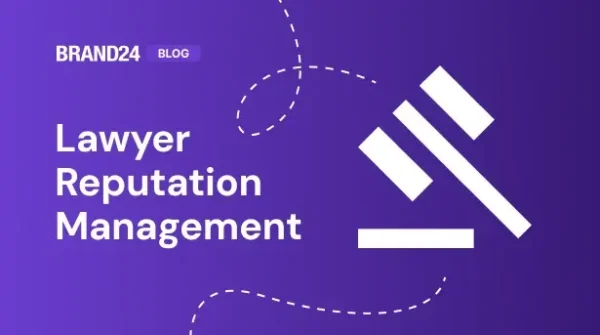How to Monitor Brand Reputation in Three Steps?
Table of contents
Nowadays, trust is one of the most important values that guides customers in their shopping choices. What’s more, people often tend to pay more for products or services from brands which they trust. But what makes customers trust certain brands more than others? The answer is easy – it’s brand reputation. And in this text, I’ll show you how can you monitor your brand reputation in three steps.
Table of contents:
Why is brand reputation monitoring important?
First of all, let’s explain why brand reputation is important for your brand and why it is worth monitoring. I’ll describe five key elements that make brand reputation important for your brand, both from the image, financial, and sales point of view.
Let’s go!
It helps to maintain positive relations with customers
Today’s business bases on relations between customers and brands.
You need to remember that by staying in touch with your customers via social media, email newsletters, conversations on forums, Quora, answering to their reviews on review sites, you are getting closer to them.
And your customers will appreciate this.
When you talk to your customers about their feelings about your products or services, it shows them that you care about their opinions, and your goal is to fulfill their needs, not only to get paid.
Thanks to this, kind of, reputation strategy, your customers’ loyalty grows, and they may become your brand’s ambassadors.
A loyal base of regular customers is a holy grail for every business. Over time, these customers will start to advertise your brand on their own, generating a valuable buzz around your company.
It helps to build customers’ trust
When your brand’s online reputation is strong, people talk positively about your products and services, and you get positive reviews on review sites like Google Reviews, TripAdvisor, Yelp, etc., trust in your brand increases.
It happens like that because people tend to trust other people’s opinions more than regular advertisements.
According to the survey provided by BrightLocal, 91% of 18-34 – year-old customers trust online reviews as much as personal recommendations.
So, the better your brand reputation is, the more trust customers have in your brand. In consequence, customers will choose your products or services more often than the competition.
So, let your sales grow!
Monitor your brand reputation for free!
It improves customer service improvement and customer retention
Customer service is one of the essential elements of a successful sales strategy. Companies that do a better job of managing customer service are more likely to see higher customer retention rates.
According to surveys provided by Microsoft, 95% of respondents cite customer service is essential in their choice of and loyalty to the brand. Also, 61% of the respondents have switched brands due to poor customer service, with nearly half done so in the past 12 months.
Thanks to media monitoring tools, you can be closer to your customers than ever before. These tools gather all the public brand mentions from the Internet in one place and give you instant access to them.
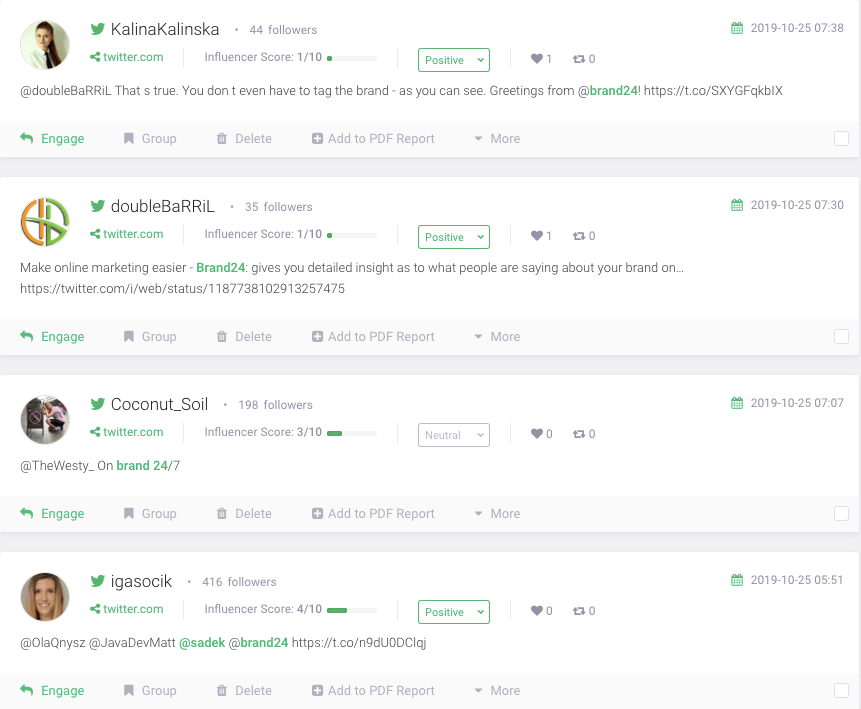
For example, in Brand24, you can go to the source of the mention directly from the tool.
It makes the process of answering to mentions containing reviews, questions, critique, or praises of your brand more accessible and faster.
And, what’s more, it also influences your brand reputation by showing that you can react fast and nip problems in the bud.
Improve your customer service and brand reputation!
It helps to discover new marketing channels
Another benefit of brand reputation monitoring is that these tools also show you a lot of interesting brand reputation metrics and insights about your brand’s online presence.
One of them is a graph showing mentions divided by category.

This graph presents you where your mentions come from, and where the most significant online buzz is around your brand.
This data can help you to discover media that you may have overlooked or ignored, and that may be a vast base of your potential clients.
It allows you to avoid or nip the reputation crisis in the bud
You have to be aware that a reputation crisis may happen to you, no matter how much effort you put into your job.
By using media monitoring tools like Brand24, you can react quickly to what’s being said about your brand.
Thanks to that, you are able to clear up misunderstandings.
Remember, it’s crucial to act fast in those situations and don’t let the crisis escalate. Thanks to sentiment analysis, you can spot negative reviews and respond to them immediately.
Prevent a reputation crisis with a monitoring tool!
How to monitor brand reputation?
Ok, now you know why brand reputation monitoring is important, so let’s find out how to do it.
Of course, you’ll need one of the media monitoring tools to do it. I’ll show you this process in the Brand24 tool.
Step one. Set up a media monitoring project
In Brand24, it’s very simple, all you need to do is:
- Register your free trial account (if you haven’t done it yet)
- Enter keywords you want to monitor
- Choose language
- Voila, your project is ready!
Looks easy, right? Indeed, but remember that the devil’s in the detail. You should pay special attention to the selection of keywords you want to monitor.
If you don’t choose the proper ones, you won’t get satisfying data.
To monitor your brand, I’d recommend choosing keywords like:
- Your brand name
- Your product/service name (especially if it’s an invented name)
- Your branded hashtag
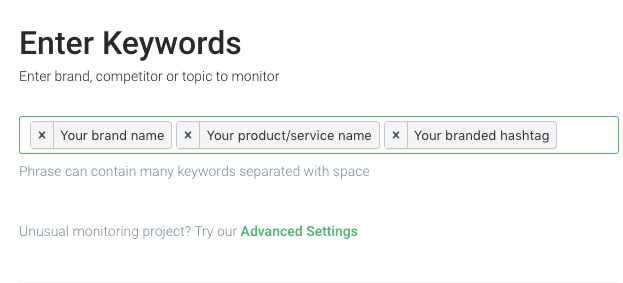
Pro tip: If your brand’s or product’s name sounds like a common word, set up some required or excluded keywords to clarify the searching process.
If you enter the required keywords, our tool will collect only the mentions containing both regular and required keywords.
If you enter the excluded keywords, our tool won’t collect the mentions containing these words.
Step two. Use sentiment analysis
First of all, let me explain what exactly sentiment analysis is.
So, sentiment analysis, with the use of natural language processing (NLP), determines whether the user is talking about your brand, product, or service in a positive, negative, or neutral way.
Sentiment analysis helps you to measure the temperature around your online activities, which has a strong influence on your brand reputation.
Analyze the sentiment around your brand!
You can take a look at the sentiment around your brand, measure how people react to your marketing initiatives, whether they like what you do or not.


What’s more, thanks to sentiment analysis, you can quickly find negative mentions about your brand and promptly respond to them.
This activity will help you not to escalate the problem, solve it, and nip the possible crisis in the bud.
OK, but how does it work?
Do we read every mention from your project and guess if it’s positive, negative, or neutral?
No, it’s way more professional.
Sentiment analysis uses deep learning algorithms and analyses the online text.
The algorithm is smart enough to recognize such elements of language as synonyms, emotionally charged words (and name these emotions), and analyze posted texts in more than 100 languages!
Of course, the algorithm still has its drawbacks and may sometimes have a little problem in detecting irony or sarcasm, but thanks to deep learning, it’s getting better and better.
Step three. React to mentions about you
People hate to be ignored, especially when they paid for something, then the product or service didn’t meet their expectations, and they want to know why something went wrong.
That’s why a significant part of a successful brand reputation strategy is to continually be in touch with your customers and react to what they say about your brand, especially if it’s a complaint or unpleasant opinion.
Thanks to media monitoring tools like Brand24 responding to mentions about your brand is easier than ever before.
In the Mentions tab, you have a list of mentions (which can be sorted by its popularity or time of publication).
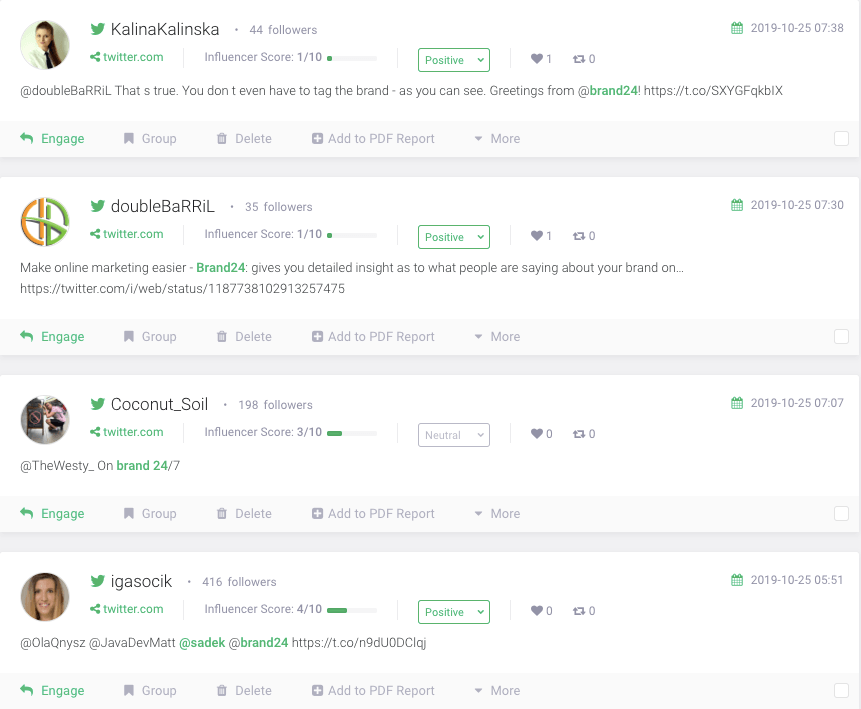
As you can see, every mention contains a bunch of information about the author and the mention itself. Here is what you’ll see:
- Name of the author
- Source of the mention
- Total number of author’s followers
- Influencer score
- The sentiment of the mention
- Total number of likes and shares of the mention
- Date
- Content of the mention
If you want to respond to the mention, all you need to do is to click on “Engage” right under the text part.

The tool will immediately redirect you to the source of the mention.
Stay in control of your reputation. Start a free trial!
It’s crucial to respond fast to negative mentions and clear up the misunderstandings because without doing it, the problem may escalate and seriously damage your brand reputation.
In consequence, your brand can lose its trust what may lead to financial loses because of clients moving to your competition.
When it comes to positive mentions, when you respond to them, you create an engagement under these posts that can make them more popular in their source media.
Thanks to bigger engagement and popularity of positive mentions about your brand, they can be visible for more people and your potential clients.
Also, people love when brands recognize their positive feedback. It makes them feel important for the brand, which positively influences their loyalty to your brand.
Learn more: To improve your knowledge, read the post prepared by our content manager Marta about social media sentiment analysis, and watch the video where our awesome Chia explains what sentiment analysis reveals:
Benefits of Brand Reputation Monitoring
Although brand reputation monitoring may cost us some effort, it’s worth it.
Brand reputation monitoring can give you benefits in areas such as:
Building customers’ trust
People buy products or services from brands they trust. That’s why customers’ trust is essential for your company’s success.
By responding to positive and negative comments, you show people that you care about their opinion, value it, and your goals aren’t only to get paid but also satisfy their needs and expectations.
It makes the customers feel valued and important for you, what, in consequence, increases their trust for your brand.
What’s more, if your customers will post positive opinions about your brand, there is a huge possibility that your potential customers will see them.
Remember what I told you before – people trust online opinions as much as personal recommendations.
Buzz marketing is a powerful weapon; use it.
Support in crisis management
The reputation crisis may happen to you.
And you know what?
It’s not the end of the world!
The most important thing is to know how to behave in such a case. Thanks to media monitoring, you can quickly find flashpoints by using sentiment analysis and react to negative words about our brand.
Start using a media monitoring tool for free!
How to do it?
Just switch the sentiment filter to negative, and you’ll see every negative mention about your brand. Respond, clear up the misunderstanding, and nip the reputation crisis in the bud!
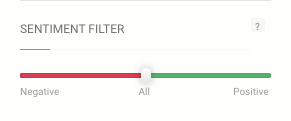
Customers insights
No matter how brilliant ideas you may have, at the end of the day, your customers are the ones who pay your bills. And this is the group you should focus on most.
So, when you launch a new product or service, use sentiment analysis to check if people like it and want to pay for this.
Brand reputation monitoring can be beneficial in verifying your ideas and may save you a lot of money and effort.
You can go even further and ask your clients what do they think about your idea. If they’ll like it, you won, roll up your sleeves, and provide it. But if they won’t pay for it, leave it, maybe this idea needs something more?
You don’t have to throw this idea away. Just leave it for some time, think twice.
Focus on your customers and listen to what they say about your brand. Maybe you’ll discover something based on their reviews?
Learn more: This is only a short list of benefits of brand reputation monitoring. Read the post specially dedicated to this topic prepared by Marta.
Conclusions
To sum up, monitoring your brand’s online reputation may cost you some time and effort, but it’s worth it.
It may give you a lot of valuable insights into your business and how your customers perceive your brand.
Thanks to this knowledge, you can adjust your marketing campaigns, new products, or services precisely to your customers’ needs.
What’s more, thanks to responding to your customer’s posts, comments, and reviews about your brand, you can build stronger relations with them what can lead to an increase of trust for your brand.
If you want to develop your knowledge about brand reputation management and brand monitoring, take a look at these posts:
What is the Online Reputation Score of Your Brand?
What Is Brand Reputation Management?
What’s the Best Way to Manage Brand Reputation?
If you want to learn more about online reputation management, take a look at our free Udemy course!
Related articles




